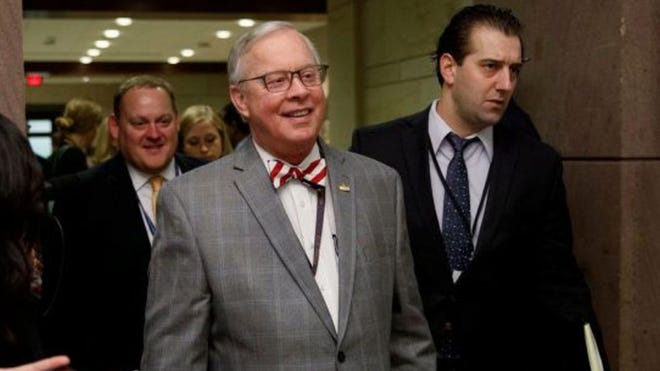
WASHINGTON – The market value of a Donald Trump election endorsement just took a hit.
A Trump-endorsed candidate lost Tuesday to a fellow Republican in a closely watched Texas congressional race, undermining Trump's claims that his endorsement is essential to a candidate's success and emboldening his political opponents ahead of the 2022 elections.
The victory by Texas state legislator Jake Ellzey makes Trump's endorsement look something like a new smartphone in a world of rapidly evolving technology, analysts said.
"Yeah, it’ll still do stuff for you, and you’d rather have it than nothing, but it’s becoming more obsolete by the day," said Republican strategist Liz Mair. "And its firepower looks increasingly weak when contrasted with newer models."
Ellzey scored a come-from-behind victory over Trump-backed Susan Wright, the widow of the late U.S. Rep. Ron Wright, in a special congressional election runoff near Dallas. Ellzey took more than 53% of the vote in Texas' 6th Congressional District, with results from almost all precincts reported.
The value of a Trump endorsement faces another test next week in Ohio, where he has endorsed one candidate in a crowded field for a U.S. House seat.
Next year, the former president plans to back primary challengers to Republicans who supported his impeachment over the Jan. 6 insurrection at the U.S. Capitol, or otherwise opposed attempts to overturn his election loss to President Joe Biden.
Trump remains popular among rank-and-file Republicans, and GOP candidates will continue to seek his endorsement, an analyst said. But the nod from the ex-president does not appear to be an automatic ticket to victory for challengers.
"They will love having it and hate losing it, but it will not win races," said Cal Jillson, a political science professor at Southern Methodist University in Dallas.
"Candidates and their campaigns win races," he said.
A reversal in Texas
Trump is trying to use endorsements as a way to maintain control of the Republican Party, but that strategy depends on wins. "Look, almost everybody I endorse wins," Trump told Fox News host Sean Hannity earlier this year.
After Ron Wright in February became the first member of Congress to die after being diagnosed with COVID-19, his widow Susan Wright declared her candidacy. She picked up support from numerous Republicans, including Trump, and finished first in an open special election in May with 19% of the vote.
Ellzey, who had noteworthy endorsements of his own, finished second in the May vote with 14%, edging out a Democrat for a spot in the runoff with Wright. He did not run an anti-Trump campaign, but often embraced Trumpian ideas in seeking to overcome the endorsement.
"One of things that we've seen from this campaign is a positive outlook, a Reagan Republican outlook, for the future of our country is what the people of the 6th District really, really want," Ellzey said to supporters following his victory.
Trump re-doubled his support of Wright just this week, cutting a get-out-the-vote Robocall in which he described himself to Texas voters as "your hopefully all-time favorite president."
Ellzey's victory demonstrates that a Trump endorsement is "not very important to the bulk of GOP voters as long as the other candidates share the voters’ positions and priorities," said Henry Olsen, a senior fellow with the Washington-based Ethics and Public Policy Center.
Olsen also called Trump's influence "a mile wide and an inch deep."
Trump needs to do more work for his candidates
The North Texas district is considered Republican country, but Trump's support has fallen since his election as president in 2016. He carried it by just 3 percentage points in his failed 2020 re-election bid.
Local factors played a role in the race, as they always do, analysts said, and Ellzey apparently worked harder than Wright during the run-off.
While Trump put out statements on Wright's behalf, he did not visit the district himself.
Matt Mackowiak, a Texas-based Republican consultant, said Wright's loss proves that "Trump must be all-in" with his endorsements.
"He didn’t raise money or show up in the district," Mackowiak said. "A half-hearted endorsement can be overcome. Susan never actively or effectively raised money. Campaigns matter, and that’s the lesson tonight."
Trump is also endorsing in a number of state races next year, including a high-profile contest in Texas.
Just this week, the president announced his support for Texas Attorney General Ken Paxton. He faces a Republican primary challenge from Texas Land Commissioner George P. Bush, the son of former Florida Gov. Jeb Bush and nephew of former president and Texas resident George W. Bush.
Some Texans said Trump went with Wright in this year's special election because of the perception that she had early momentum and would face little resistance in her run for Congress. She also had support from the Club For Growth, the conservative economic organization.
Yet Ellzey had his own endorsements, including one from former Texas governor and Trump-appointed Energy Secretary Rick Perry.
"Donald Trump couldn't pick Susan Wright out of a lineup," Perry told Capital Tonight, a Texas news outlet. "He has no idea who she is, has no idea what she believes."
Next up: Ohio special election
The true value of a Trump endorsement gets another test next week in a special election in Ohio.
Trump is backing former energy lobbyist Mike Carey in a race to replace Rep. Steve Stivers, R-Ohio, who retired from Congress to become president and CEO of the Ohio Chamber of Commerce. Carey is part of an 11-candidate field that includes what Trump has called a "gang of RINOS," which stands for Republicans In Name Only.
J. Miles Coleman, an associate editor with the University of Virginia Center for Politics, said Trump's loss in Texas puts more of a premium on the race in Ohio.
"Trump may risk another black eye," Coleman said. "Two losses in a row would have some people really questioning his relevance."
The Associated Press contributed to this report

Source link








